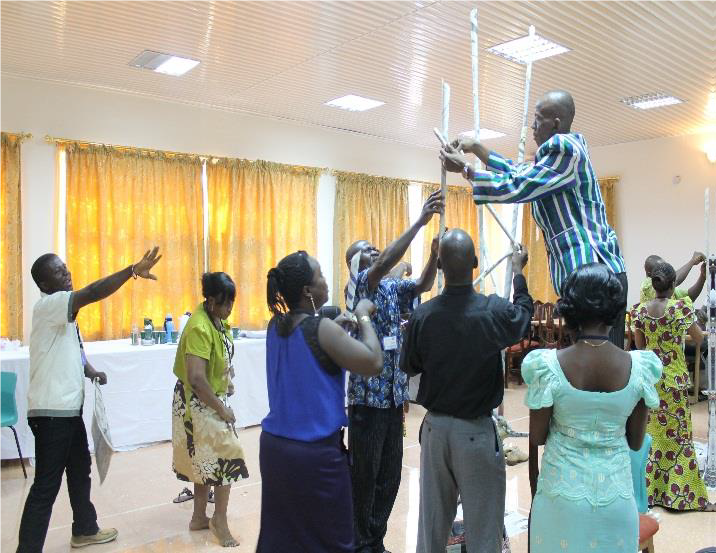Civil Society Organizations in the North West region of Cameroon and the Sustainability Dilemma.
Civil society organizations (CSOs) in Cameroon in general and the North West, in particular, have for over the years influenced (in no small measure) the formulation of development policies in the region and have been purveyors of a new vision of socio-economic development and prosperity, which is a holy grail in the North West region. In furtherance, civil society is "the arena, outside of the family, the state, and the market, which is created by individual and collective actions, organisations and institutions to advance shared interests." (CIVICUS, 2013).
With their laborious effort, they have increased in their numbers, in their relevance, and their activities have outstretched the North West region. More so, the development paradigm and landscape for civil society and its operations have continuously changed in remarkable ways over the years. These and many other development initiatives from stakeholders are gradually affecting how civil society remains sustainable financially, institutionally and operationally.
Over time, whilst the term civil society sustainability appears to be gaining steam, its usage, seems to have different meanings to different people. Many CSOs see sustainability as the availability of funds. However, research suggests that CSOs (NGOs, FBOs, CBOs, Associations, CIGs) need more than funding to be sustainable. Sustainability is more than the availability of funds and goes further beyond survivability.
As defined by the West African Civil Society Institute (WACSI), Sustainability is " The strong ability and capacity of an organisation to maintain independence, to continually generate expected funds to pursue planned operations, to command strong recognition and legitimacy, to exert influential power in its mission and the sector in which it operates". An understanding of sustainability could be examined from four different dimensions (WACSI 2015);
- Financial (the continuous availability of financial resources),
- Operational (capacity, technical resources and administrative structures to operate programmes),
- Identity (the long-term existence of organizations themselves) and
- Interventions (the continuity of results, impact of specific projects after their completion or funding ends).
Therefore, a purview of civil society sustainability requires a holistic and integral approach that involves anchoring on institutional health and sustenance of impact from interventions, financial soundness, the functionality of operations, visibility, recognition and legitimacy in their area of intervention, to name a few.
For time immemorial, civil society organizations relied on external funding and donations which came from private trust, philanthropies, foundations, development partners, the United Nations and its agencies, individuals, religious institutions, and in many cases other grant-making nonprofit organizations. (WACSI,2015) In recent times, the context of this funding landscape is changing with a drop in funding from traditional sources who support civil society work, creating both challenges and opportunities. These raise serious questions about the sustainability of civil society organizations in the North West region of Cameroon and an ardent need for its rethink.
Amongst reasons for the change in this aid dynamics, have been re-prioritization, by traditional donors, increasing shrinkage in the civic space, and the changing global economic and geopolitical power including the rise of China and the role of technology in altering funding models. In this light, civil society organizations are with questions about their future and credibility in their spaces which requires equanimity.
Notwithstanding, the changes in the development paradigm and differences in the understanding of sustainability, the works and strides to intervene in areas of critical importance to humanity by civil society cannot be overemphasized. Whilst the number of CSOs have increased in the past decades in the North West region of Cameroon, it is indispensable that a reflection to build a civil society sustainability index to ensure holistic sustainability is engaged. This will enable them to have the wherewithal required to continue efficiently and effectively, to deliver timely services to the constituents they serve far afield and evade the hassles that have prevented them from outgrowing their present capacity. This will be possible by;
- Developing a clear mission, vision and values
- Enhancing the quality and continuity of services and programs
- Develop influential power
- Institutionalizing good internal governance practices
- Diversifying Resource streams through a resource mobilization plan and develop sound financial management systems
- Building partnerships
- keeping a positive public profile
- Developing institutional capacity and infrastructure
- Strengthening results communication
- Ensuring community ownership of projects
Bibliography
- WACSI (2015) The State of Civil Society Organisations’ Sustainability in Ghana: Striving, Surviving or Thriving? Accra, Ghana.
- Hilhorst, Dorothea, 2003. The real world of NGOs: Discourses, diversity and development. London: ZED.
- Heurlin, Christopher, 2010. “Governing civil society: The political logic of NGO-state relations under dictatorship”. Voluntas, 21, 220- 239.
- WACSI (2015) Civil Society and Development in West Africa: Practitioners’ Perspective. Accra, Ghana.
- Elongue, C. Vandyck C. K. (2019). Advancing The Financial Sustainability of Civil Society in Africa. West Africa Civil Society Institute, Accra, Ghana.
- Image source: "The Sustainability Tower" WACSI
